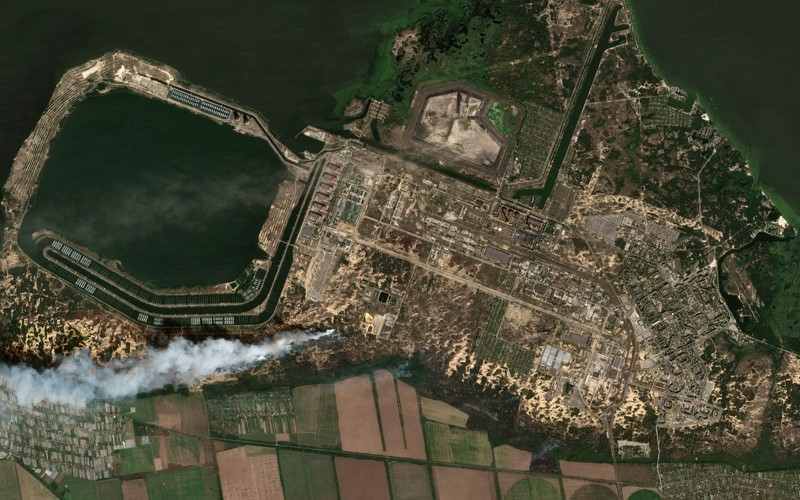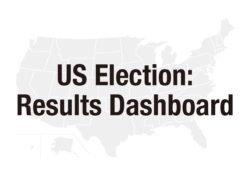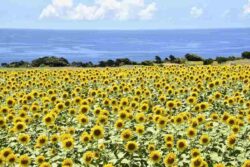Ukraine, Russia exchange blame for more shelling at nuclear plant

Overview of Zaporizhzhia nuclear power plant and fires, in Enerhodar in Zaporizhzhia region, Ukraine, August 24, 2022.
12:23 JST, August 28, 2022
Ukraine and Russia traded blame for fresh shelling at the Zaporizhzhia nuclear power plant Saturday, underscoring the persistent danger of fighting around the plant as the United Nations’ atomic watchdog prepares to visit the site next week.
The fighting has raised global alarm about the risk of a nuclear accident and prompted urgent calls from world leaders for international inspectors to be granted access to the facility. Russia has occupied the nuclear power plant – Europe’s largest – since March, though Ukrainian workers continue to operate it. Explosions and fires in the area in recent days have led to the deaths of two workers and temporarily disconnected electricity to and from the plant, producing mass power outages in nearby villages.
Russian troops “repeatedly” targeted the facility between Friday and Saturday afternoons, Ukraine’s nuclear power agency said in a statement Saturday. “As a result of periodic shelling, the infrastructure of the power plant has been damaged, there are risks of hydrogen leakage and sputtering of radioactive substances, and the fire hazard is high,” the agency said.
Russian Grad rockets and artillery shells damaged houses, power lines and an educational center in Nikopol, a city across the river from the Zaporizhzhia plant, and in neighboring villages, Valentyn Reznichenko, governor of Ukraine’s Dnipropetrovsk region, said in a Telegram post Saturday. Residents told The Post they were without power for several hours.
Moscow, meanwhile, blamed Kyiv’s forces for attacks on the nuclear plant, alleging Saturday that shells launched by the Ukrainian military from the village of Marhanets hit the power plant’s territory three times over the previous day.
Ukrainian forces fired 17 shells, Russia’s Defense Ministry alleged – with four hitting the roof of a building housing nuclear fuel and 13 exploding near storage sites for nuclear fuel and solid radioactive waste.
None of the claims could be independently verified.
World leaders and nuclear experts worry the fighting could compromise the plant’s cooling systems, causing a nuclear meltdown. Radioactive material that leaks from the site could contaminate nearby areas and possibly blow across Ukraine’s borders – posing a silent threat to human health and the environment for years.
Local authorities in the Zaporizhzhia region have begun distributing potassium iodide tablets to residents in case of such a leak. Officials emphasized that people should only take them after a nuclear accident occurs – not as a preventive measure. The pills can help block radioactive iodine from being absorbed by the thyroid, decreasing the risk of developing thyroid cancer later from exposure to radioactive material.
Radiation levels remained normal, Russian and Ukrainian authorities said.
Besides contending with near-daily shelling and fraying infrastructure, Ukraine’s state nuclear power company Energoatom says the plant’s workers have also been subject to intimidation, detention and torture by Russian forces who control the facility. On Saturday, Energoatom accused Russian forces of setting up a “torture chamber” in one of the plant’s underground bunkers aimed at rooting out any dissent among the workers.
The new allegations come just days before an expected visit to the facility by a team of nuclear experts led by the director general of the International Atomic Energy Agency, Rafael Grossi.
Ukrainian Foreign Minister Dmytro Kuleba said the visit is critical so that the IAEA can inform the world that the presence of Russian forces at the plant is an “imminent threat to nuclear security.”
But Ukrainian officials remain worried that Russian forces will sanitize the plant ahead of the visit and intimidate workers into not telling the truth about Russian behavior, resulting in the IAEA blessing the safety protocols followed at the plant, and in effect legitimizing Russia’s occupying presence.
“The worst-case scenario is when they come and say it’s best that the station is under Russian control [and] in general, nuclear safety protocols are followed,” Kuleba said in an interview at the Ministry of Foreign Affairs. “This will mean that the Russians stay.”
The negotiations over the visit are being fleshed out between Grossi, Kuleba and their Russian counterparts. Moscow has insisted that Russian media be allowed to cover the IAEA visit – a demand Kuleba said Ukraine would likely accept as long as Ukrainian and international media were also allowed to cover the visit.
“In principle, we have nothing against allowing media coverage, but we have to do it smartly and to minimize the opportunities for the Russians to turn that into a propaganda event,” Kuleba said.
Though the plant is under Russian control, it is run by about 1,000 Ukrainian workers, which is less than 10 percent of its usual workforce. Some Ukrainian officials hope that the IAEA will record accounts of abuse of plant workers but the president of Energoatom, Petro Kotin, said the plant’s workers are unlikely to divulge information that is critical of Russia for fear of punishment.
“It is a very big danger for them,” Kotin said in an interview.
Another sticking point in the talks over the IAEA visit has been how to guarantee the safety of international inspectors while they work in an active war zone – an issue likely to take on added urgency after the latest shelling around the plant.
“We bear responsibility for the mission and we have to protect them from a potential provocation or even false-flag operation staged by the Russians,” Kuleba said.
Ukraine renewed calls Saturday for Russian forces to withdraw from the plant. Moscow has said its troops are protecting the facility.
Russia blocked the adoption late Friday of the final document in a weeks-long review of the United Nations’ key nuclear disarmament treaty. The draft text expressed concern about Russia’s military takeover of the Zaporizhzhia site.
The move dealt a blow to the efforts of delegates from 151 countries to shore up the Non-Proliferation Treaty, the more than 50-year-old global agreement on nuclear nonproliferation. The treaty is reviewed at a U.N. conference every five years.
Igor Vishnevetsky, deputy director of arms control and nonproliferation at the Russian foreign ministry, told assembled officials that the final draft of this review cycle’s declaration did not achieve “balance.”
“Our delegation has one key objection on some paragraphs which are blatantly political in nature,” he said.
The 36-page document contained four paragraphs on the Zaporizhzhia facility, voicing “grave concern” over Ukraine’s loss of control and support for the IAEA’s efforts to inspect the plant.
Officials from a range of countries lamented the inability of countries to reach consensus at a time of heightened nuclear threat, with some directing sharper words toward Moscow.
“We were not able to achieve a consensus document because of the inexplicable choice of one state,” Adam Scheinman, the U.S. special representative for nuclear nonproliferation, wrote on Twitter Friday night. “The U.S. deeply regrets Russia’s refusal to acknowledge the grave situation in Ukraine. It is absurd that Russia could not do so.”
Separately, the State Department confirmed the death of another American in Ukraine.
“We are in touch with the family and providing all possible consular assistance,” a State Department spokesperson told Post. “Out of respect to the family during this difficult time, we have nothing further to add.”
The official urged U.S. citizens not to travel to Ukraine because of the war and “the singling out of U.S. citizens in Ukraine by Russian government security officials.”
Oleg Kozhemyako, the governor of Russia’s far eastern Primorsky Krai region, said in a Telegram post Friday that members of a military unit from his region had killed the American during a battle, CBS News reported. He said the man had been fighting on Ukraine’s behalf and was killed “in the first clash literally immediately after arriving at the front line.”
The claims could not be independently verified.
"News Services" POPULAR ARTICLE
JN ACCESS RANKING







